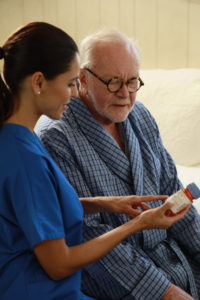First Steps After a Loved One’s Dementia Diagnosis
There will be many emotions involved when you first hear that a loved one has been diagnosed with dementia. You may feel sadness, fear,  and anger that a life may be cut short or lose the vibrancy it once had. Dementia can be a scary disease, and it can be confusing to both your loved one and those around him or her. There are over 60 different types of dementia out there, and the disease manifests differently in each person. Therefore, it can also be incredibly unpredictable.
and anger that a life may be cut short or lose the vibrancy it once had. Dementia can be a scary disease, and it can be confusing to both your loved one and those around him or her. There are over 60 different types of dementia out there, and the disease manifests differently in each person. Therefore, it can also be incredibly unpredictable.
If you find yourself in the position where someone you are close to receives the news, here are some first steps to take after a dementia diagnosis.
Learn About the Condition
Whether it is Alzheimer’s Disease, Vascular Dementia, or another type of dementia, spend some time researching the condition. Talk to your loved one about how they are feeling, and come up with a list of questions to ask the doctor. No question is off limits! Dementia is a disease that will change your whole world, and it’s only right that you be prepared as best as you can. Try to get an understanding ahead of time of how the disease will affect your loved one’s mind and body. This preparation will help you down the road as the changes start to occur.
Take Medical Advice and Set-Up Appointments
Your loved one’s doctors will know best when it comes to preparing for the journey through this condition if they have had other patients in the same boat. Follow the health advice of the doctors and ask for follow-up appointments to monitor progress. Ask if your loved one should see any other type of health care professional like a dentist or counselor. It might be a good idea to get several referrals for other kinds of doctors ahead of time to start setting up appointments while your loved one is still aware of how they are feeling. That way, your team of doctors will know how to best monitor changes in health—both mentally and physically.
Start Planning Long-Term
If you haven’t done your long-term planning with your loved one yet, now is the time. It’s best not to delay, because you never know how quickly the disease will take over and cause your loved one’s mental state to deteriorate. Contact lawyers and financial planners to get Power-of-Attorney and end-of-life documents in order. It’s never an easy topic, but you need to understand your loved one’s desires for end-of-life care while they are still able to articulate them to you. Make sure that their affairs are in order before it’s too late.
Look for Support
Support can come in a lot of different forms, but you can always start to look for support resources online. Whether you want to join a local support group, or you would rather join one online, there are many caregiving and family –oriented organizations for loved ones of dementia patients. Also, begin to tell trusted friends and family who you may need to lean on in the coming months and years. Hopefully, they will understand, but it’s best that you let them know what you are struggling with as your loved one’s disease progresses. Your journey will not be easy, so it’s always a good idea to have a support system behind you.
Set-up In-Home Care After a Dementia Diagnosis
If you will be the primary caregiver, or if your loved one does not have someone who can take care of them regularly, it might be a good idea to look into in-home caregiving services. As your loved one’s disease progresses, it will be harder and harder for them to understand unfamiliar places. Many dementia patients undergo a lot of stress and anxiety when they must leave home. For your loved one’s own safety and comfort, it may be the best idea to bring a qualified caregiver into the home to ease the transition from independence to full-time care.
If you are interested in learning more about in-home caregiving services, contact us at 24/7 Nursing Care. We place qualified, reliable caregivers and nurses into the homes of our clients. We look forward to speaking with you about your needs. We can be reached at 855-Nurse44.
References:
Kidd, E. (2019, March 19). A diagnosis of dementia – now what? Retrieved from https://www.independenttribune.com/news/a-diagnosis-of-dementia—now-what/article_cc7213c4-3aa0-11e9-b9ed-eb216c613512.html
Now What? Next Steps After an Alzheimer’s Diagnosis. (n.d.). Retrieved from https://www.nia.nih.gov/health/now-what-next-steps-after-alzheimers-diagnosis



